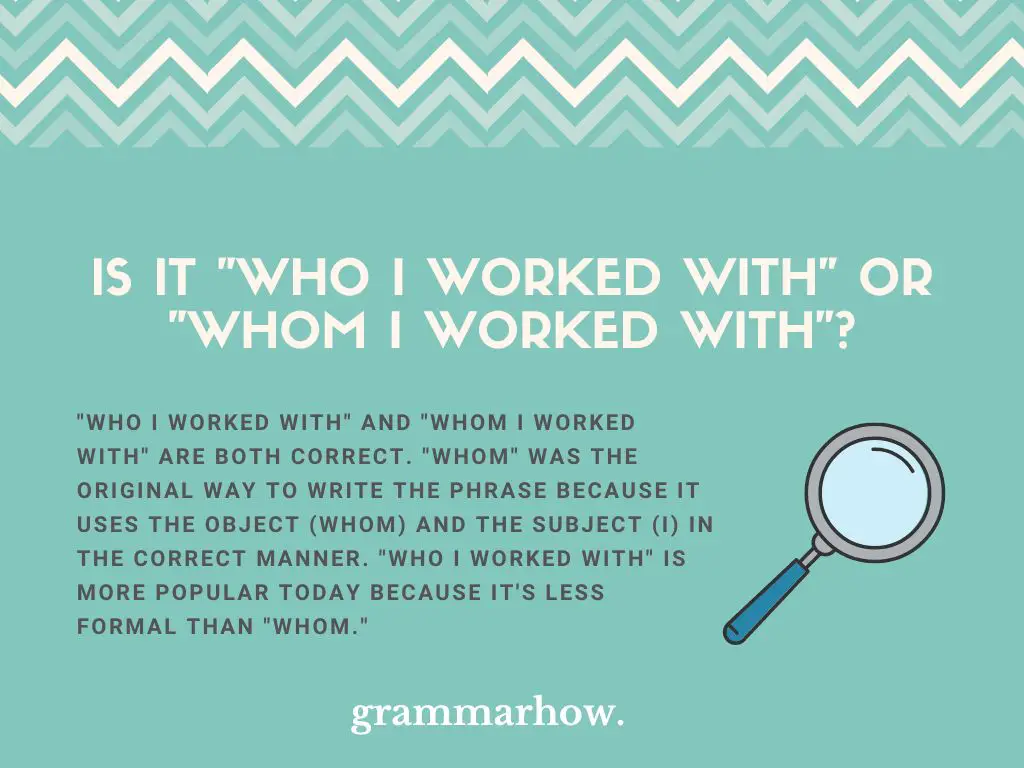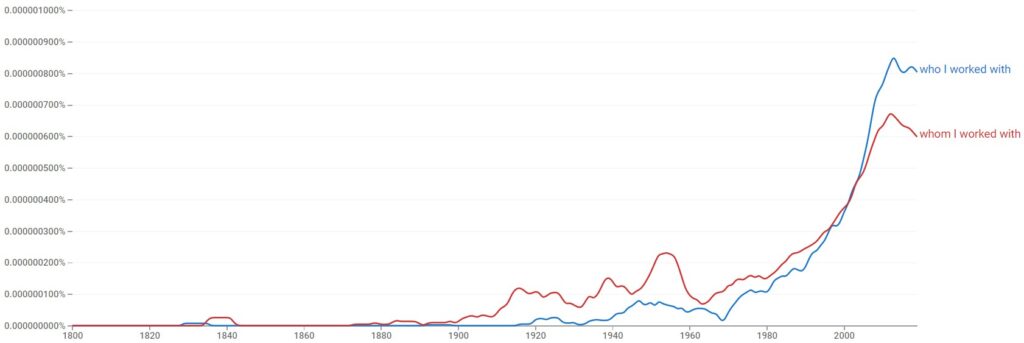We can use “who” and “whom” in very similar ways lately. Once upon a time, the two words had different meanings, but it seems like that meaning is becoming more obscure as time goes on and language evolves. This article will explain how “who” or “whom I worked with” works.
Is It “Who I Worked With” or “Whom I Worked With”?
“Who I worked with” and “whom I worked with” are both correct. “Whom” was the original way to write the phrase because it uses the object (whom) and the subject (I) in the correct manner. “Who I worked with” is more popular today because it’s less formal than “whom.”

The problem with using “whom I worked with” is that most people thought it was too formal to include in daily conversation. Native speakers frequently mistook the use of “who” and “whom,” so they inevitably started to phase “whom” out of their vocabulary.
While “whom” is clearly the correct choice because it’s an object that relates to the subject of “I,” it’s not the choice that most native speakers stick with today.
With that said, both “who I worked with” and “whom I worked” with are interchangeable. They both work informally and formally, and it’s up to you to decide which one you think works best for you.
According to Google Ngram Viewer, “who I worked with” is the most popular choice, and it continues to grow. “Whom I worked with” is still fairly common, but it’s not on the same level as “who.”

You might also notice that around the 2000s, “whom” and “who” swapped in popularity. We can use this information to learn that “whom” was the original way of writing the phrase but has since been forgotten.
Who I Worked With
“Who I worked with” is correct, but it’s more suitable informally. “Who” and “I” are both subjects, so it’s not always correct to phrase a sentence in this way. Nevertheless, people prefer using “who” to “whom” because it’s more familiar to them in daily usage.
- Sharon, who I worked with for years, has passed away. I’m really devastated about that news, actually.
- I think that’s Dave, who I worked with for ages, but I can’t tell him apart from a crowd because I never liked him.
- My boss, who I worked with since starting at this company, has finally offered me that promotion I’ve been chasing.
- That is the girl who I worked with for a long time, but I never managed to pluck up the courage to talk to her.
Whom I Worked With
“Whom I worked with” is grammatically correct. It uses an object and a subject, which is ideal when you’re creating a correct sentence structure. “Whom” is losing popularity lately, though, because people think it’s too old-fashioned to fit into most sentences.
- Fred, whom I worked with for quite a few years, has finally decided to move on. Good for Fred.
- Peter and Terry, whom I worked with side-by-side at the station, have left me for another city! Man, I’m jealous of them.
- The people whom I worked with at that company are of no use to me anymore. I know it’s harsh to say that, but it’s the truth.
- I think you’ll find that the guys whom I worked with were all top-notch lads. I’ll take any one of them with me to this new venture.
Which I Worked With
You can use “which I worked with” when you’re not talking about people. “Who” and “whom” are specific to people, but “which” works well when we’re talking about other things. For example, if you’re talking about machines, you might use “which” as the object instead of “whom.”
- The machine which I worked with for many years is finally being decommissioned today.
- That thing, which I worked with for as long as I can remember, still confuses me to this day.
- The companies which I worked with have not offered me many suitable contracts. I don’t like going to see them.
- The vehicles which I worked with are all out of action now. I wish they could have stuck around for longer.
Final Thoughts
We can use both phrases interchangeably. “Whom I worked with” is better for formal situations since it sticks to the original rules that relate to a sentence having both an object and a subject. “Who I worked with” works just as well but is better suited for informal sentences.
You may also like:
“Who I Met” or “Whom I Met”? Correct Version (With Examples)
“To Who” or “To Whom”? Correct Version (With Examples)
Is It “Whom Should I Contact” or “Who Should I Contact”?

Martin holds a Master’s degree in Finance and International Business. He has six years of experience in professional communication with clients, executives, and colleagues. Furthermore, he has teaching experience from Aarhus University. Martin has been featured as an expert in communication and teaching on Forbes and Shopify. Read more about Martin here.
